仁爱版英语八年级下册Unit 7 Food festival重点知识点语法点总结单元复习课件(共27张PPT)
文档属性
| 名称 | 仁爱版英语八年级下册Unit 7 Food festival重点知识点语法点总结单元复习课件(共27张PPT) |
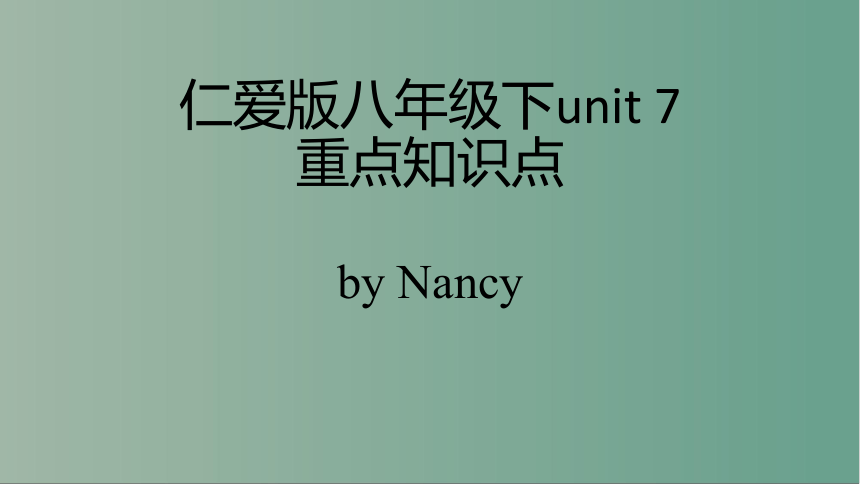
|
|
| 格式 | zip | ||
| 文件大小 | 110.5KB | ||
| 资源类型 | 教案 | ||
| 版本资源 | 仁爱科普版 | ||
| 科目 | 英语 | ||
| 更新时间 | 2022-04-27 10:16:31 | ||
图片预览

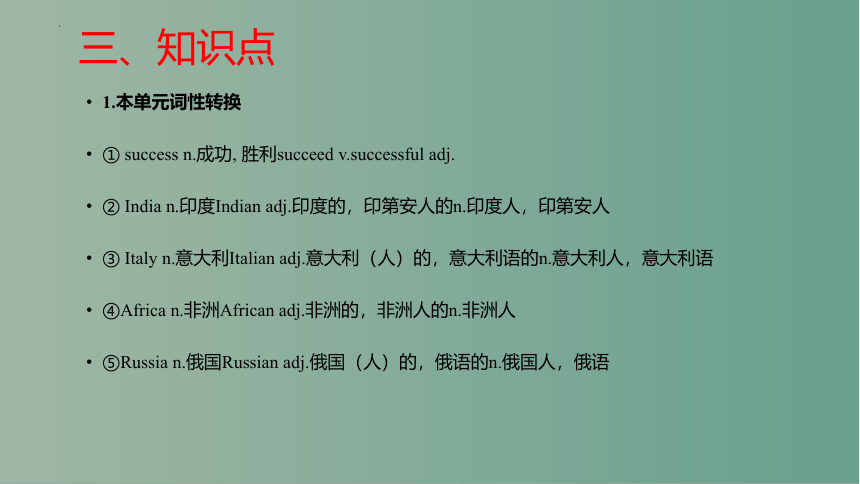
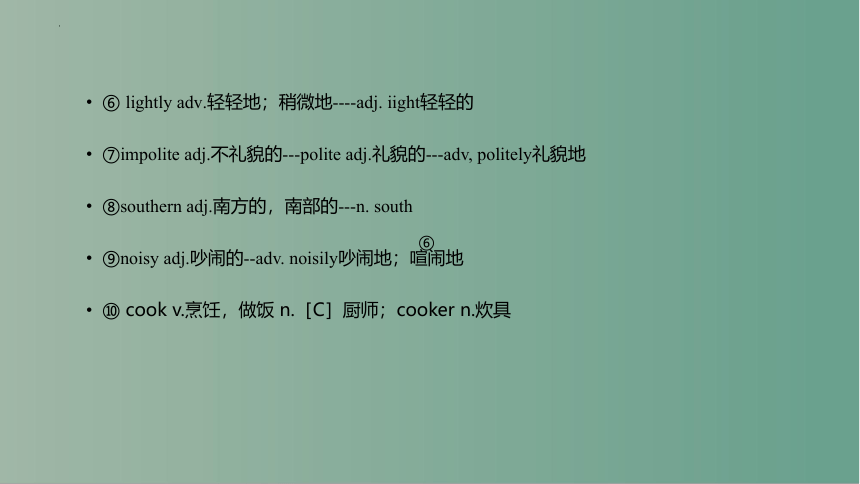
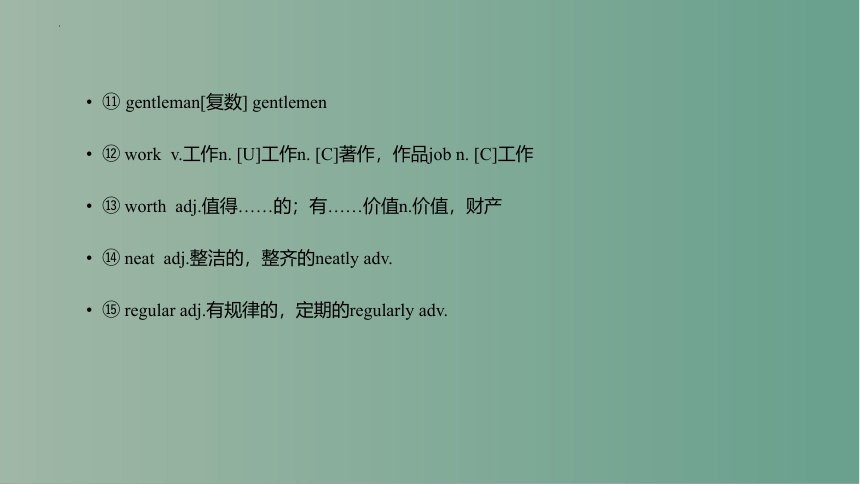
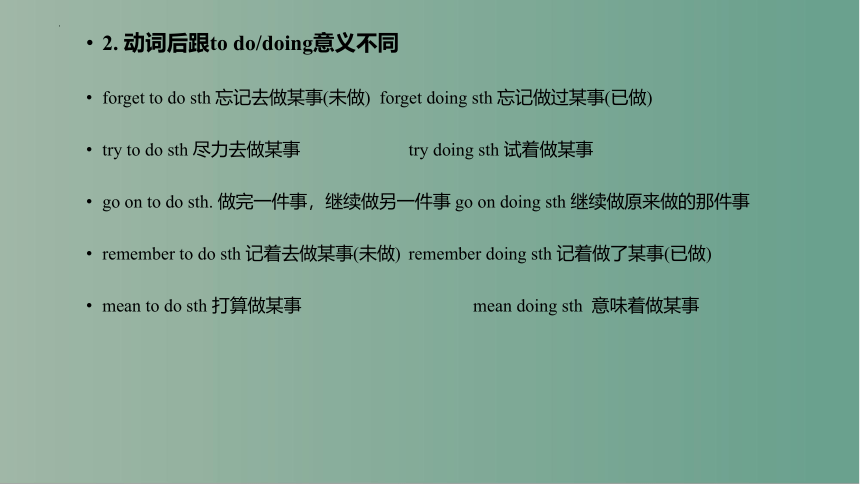
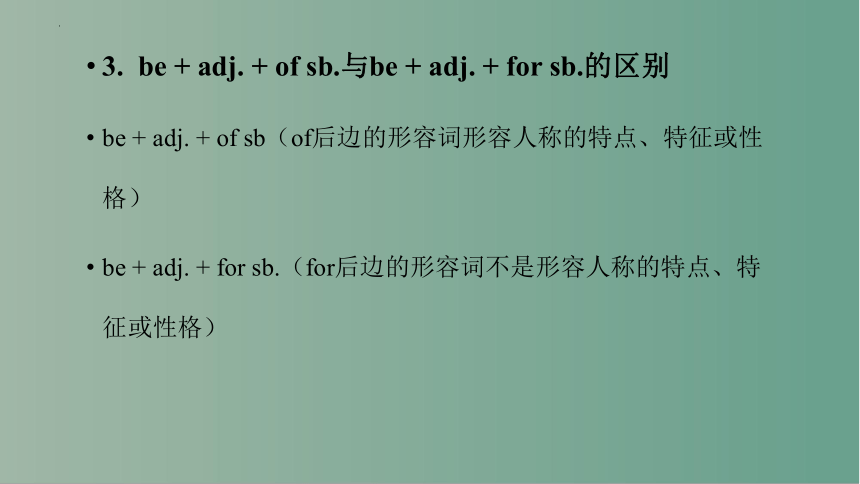
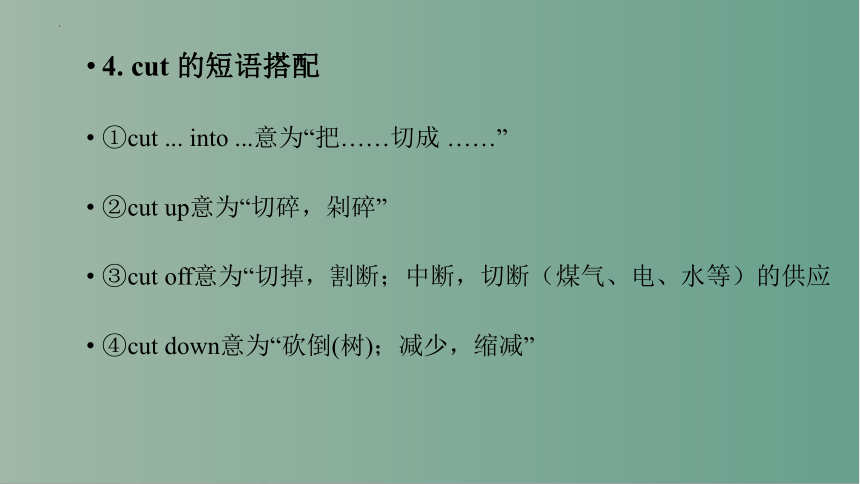
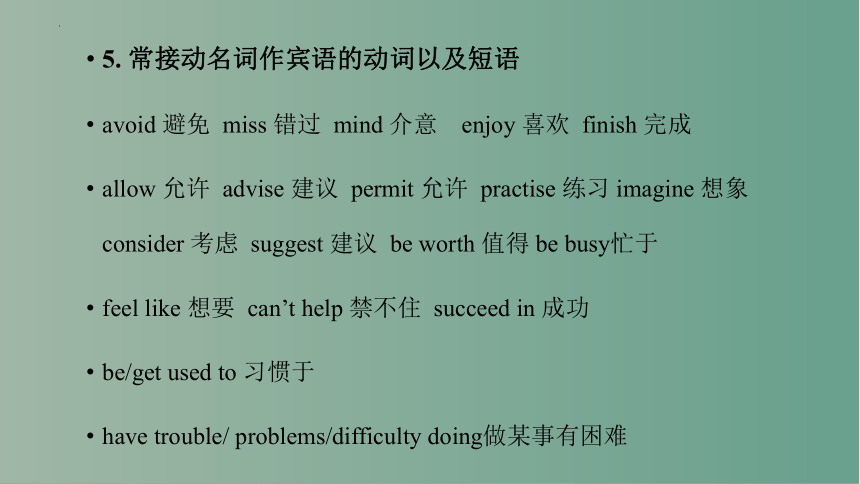
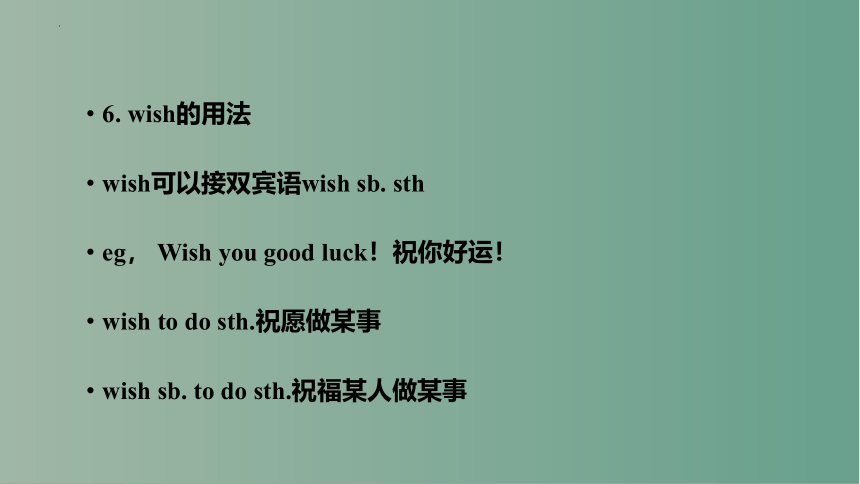
文档简介
(共27张PPT)
仁爱版八年级下unit 7
重点知识点
by Nancy
三、知识点
1.本单元词性转换
① success n.成功, 胜利succeed v.successful adj.
② India n.印度Indian adj.印度的,印第安人的n.印度人,印第安人
③ Italy n.意大利Italian adj.意大利(人)的,意大利语的n.意大利人,意大利语
④Africa n.非洲African adj.非洲的,非洲人的n.非洲人
⑤Russia n.俄国Russian adj.俄国(人)的,俄语的n.俄国人,俄语
⑥ lightly adv.轻轻地;稍微地----adj. iight轻轻的
⑦impolite adj.不礼貌的---polite adj.礼貌的---adv, politely礼貌地
⑧southern adj.南方的,南部的---n. south
⑨noisy adj.吵闹的--adv. noisily吵闹地;喧闹地
⑩ cook v.烹饪,做饭 n.[C]厨师;cooker n.炊具
⑥
gentleman[复数] gentlemen
work v.工作n. [U]工作n. [C]著作,作品job n. [C]工作
worth adj.值得……的;有……价值n.价值,财产
neat adj.整洁的,整齐的neatly adv.
regular adj.有规律的,定期的regularly adv.
2. 动词后跟to do/doing意义不同
forget to do sth 忘记去做某事(未做) forget doing sth 忘记做过某事(已做)
try to do sth 尽力去做某事 try doing sth 试着做某事
go on to do sth. 做完一件事,继续做另一件事 go on doing sth 继续做原来做的那件事
remember to do sth 记着去做某事(未做) remember doing sth 记着做了某事(已做)
mean to do sth 打算做某事 mean doing sth 意味着做某事
3. be + adj. + of sb.与be + adj. + for sb.的区别
be + adj. + of sb(of后边的形容词形容人称的特点、特征或性格)
be + adj. + for sb.(for后边的形容词不是形容人称的特点、特征或性格)
4. cut 的短语搭配
①cut ... into ...意为“把……切成 ……”
②cut up意为“切碎,剁碎”
③cut off意为“切掉,割断;中断,切断(煤气、电、水等)的供应
④cut down意为“砍倒(树);减少,缩减”
5. 常接动名词作宾语的动词以及短语
avoid 避免 miss 错过 mind 介意 enjoy 喜欢 finish 完成
allow 允许 advise 建议 permit 允许 practise 练习 imagine 想象 consider 考虑 suggest 建议 be worth 值得 be busy忙于
feel like 想要 can’t help 禁不住 succeed in 成功
be/get used to 习惯于
have trouble/ problems/difficulty doing做某事有困难
6. wish的用法
wish可以接双宾语wish sb. sth
eg, Wish you good luck!祝你好运!
wish to do sth.祝愿做某事
wish sb. to do sth.祝福某人做某事
四、语法点
宾语从句Ⅰ:在句中担当宾语的从句叫宾语从句。宾语从句一般在及物动词或者介词之后。
宾语从句的注意点:1. 时态 2. 语序 3. 连接词
(一)时态
1.若主句的时态为一般现在时,从句可以用任何时态
I wonder why he was late this morning
2.若主句的时态为一般过去时,从句用一般过去时,过去进行时,过去将来时以及过去 完成时.
3.特殊情况:若宾语从句是客观事实或真理,则不受主句时态的影响
(二)语序
宾语从句的语序应为陈述句的语序(连接词+主语 + 谓语 + 其他)
Can you tell me how I can get to the station
(三)连接词
宾语从句的引导词有三种:
1.疑问代词:who,what,which,whom,whose,whatever,whoever,whichever
2.疑问副词:when,where,how,why
3.从属连词:that,whether, if
宾语从句Ⅱ
if或whether引导的宾语从句用法由连接词if或whether引导的宾语从句,实际上是一般疑问句演变而来的,意思是“是否”。且if或whether引导的宾语从句要用陈述句语序。
一般情况下,whether 和if 可以互相交换, 但有些情况例外
①介词短语后只用whether 不用if
②引导词与动词不定式或or not 连用时,只用whether.
注意:
1.that 在宾语从句中不充当成分,无意义,只起连接的作用,有时候可省略.
2.连接代词和连接副词在宾语从句中充当成分,且有含义。引导宾语从句时,不可省略
3.当主句和宾语从句的主语一致时,宾语从句中
疑问词+陈述语序的句子= 疑问词+ to do.
I don’t know how I can get to the police station
= I don’t know how to get to the police station
1.副词的比较级和最高级的构成
(1) 英语中的副词通常有三个等级:原级、比较级、最高级。
(2) 副词比较等级的用法
3. 副词的比较形式
原级比较:一般来说,不存在比较对象或进行同级比较时用原级。
结构:甲+谓语(行为动词)+as+副词的原级+as +乙,
表示前者不如后者时,用“not so(as)+副词原形+as”的句式
.比较级:表示一方程度比另一方更高时,用“副词比较级+than”的句式。即:甲+谓语(行为动词)+副词的比较级+than +乙在这一句式中,当than前后的动词相同时,通常用助动词代替后面的动词。该动词或助动词可以省略。副词比较级前常用even, still ,a lot,far ,much , a little,等副词修饰。
结构:甲+谓语(行为动词)+副词的比较级+than +乙
最高级:表示三个或三个以上的人或物的比较时,用副词最高级。结构为“the+副词最高级+比较范围。
结构:甲+谓语(行为动词)+副词的最高级+in/of +比较范围.其中的the常省去,比较范围常用of或in…短语。
the+序数词+最高级,表示 第几...
注意:副词最高级转换成比较级时,被比较的对象应用“any other +单数名词”或“the other +复数名词”,排除主语本身。
eg,
Michael works hardest in his class.
=Michael works harder than any other student in his class.
=Michael works harder than the other students in his class.
相关练习题
(一)单项选择
1. Which one goes ____, the car, the train or the plane
A. fast B. faster C. fastest D. the fast
2. —____ that the 31st Olympic Games will be held in New York.
—____ exciting news!
A. It said; What B. It is said; What C. It said; How D. It is said; How
3. ____ Lily ____ Milly like pizza. They often say pizza is very delicious.
A. Either; or B. Neither; nor C. Not only; but also D. Both; and
4. I did ____ in last English exam and I hardly made mistakes.
A. enough good B. good enough
C. enough well D. well enough
5. Amy makes fewer mistakes than Frank. She does her homework ____.
A. more carefully B. more carelessly
C. more careful D. more careless
6. Remember not to have ____ drink.
A. too many B. too much C. many too D. much too
7. When you go to a dinner party, you should ____.
A. speak quiet B. speak quietly C. speak few D. spoke quietly
8. —How’s the weather tomorrow —I don’t know if it ____ tomorrow.
—Well, if it ____, I won’t go out with you.
A. will rain; will rain B. rains; rains
C. rains; will rain D. will rain; rains
(二)用首字母或者提示词填空
1. My parents often eat vegetables and other _________ (health) food.
2. After a short rest, he seemed to be _________ (tired) than before.
3. _________ (cook) is fun and I love it very much!
4. In the _________ (south) part of China, people usually like eating rice.
5. Help _________ (you) to some chicken soup, kids.
healthy
less tired
Cooking
southern
yourselves
6. Most things _________ (值得) having never come easy.
7. In China, we like to use c_________ to eat.
8. Television, like other things, has both a_____________ and disadvantages(缺点).
9. —Where is the m_________ I want to order something to eat.
—Here it is.
10. I only r_________ (遗憾) that I missed my sister’s wedding (婚礼).
worth
arrots
dvantages
enu
regretted
(三)完成句子
1. Luo cooked the most finely in his class. (改为同义句)
Luo cooked _________ finely _________ any other student in his class.
2. They used a knife and fork to have dinner. (对画线部分提问)
_________ _________ they use to have dinner
more
than
What
did
3. Does Mr. Brown enjoy living in China Could you tell us (合并为含宾语从句的复合句)
Could you tell us _________ Mr. Brown _________living in China
4. The Indian curries are very delicious. (改为感叹句)
_________ _________ Indian curries!
if/whether
enjoys
How
delicoious
谢谢大家!
仁爱版八年级下unit 7
重点知识点
by Nancy
三、知识点
1.本单元词性转换
① success n.成功, 胜利succeed v.successful adj.
② India n.印度Indian adj.印度的,印第安人的n.印度人,印第安人
③ Italy n.意大利Italian adj.意大利(人)的,意大利语的n.意大利人,意大利语
④Africa n.非洲African adj.非洲的,非洲人的n.非洲人
⑤Russia n.俄国Russian adj.俄国(人)的,俄语的n.俄国人,俄语
⑥ lightly adv.轻轻地;稍微地----adj. iight轻轻的
⑦impolite adj.不礼貌的---polite adj.礼貌的---adv, politely礼貌地
⑧southern adj.南方的,南部的---n. south
⑨noisy adj.吵闹的--adv. noisily吵闹地;喧闹地
⑩ cook v.烹饪,做饭 n.[C]厨师;cooker n.炊具
⑥
gentleman[复数] gentlemen
work v.工作n. [U]工作n. [C]著作,作品job n. [C]工作
worth adj.值得……的;有……价值n.价值,财产
neat adj.整洁的,整齐的neatly adv.
regular adj.有规律的,定期的regularly adv.
2. 动词后跟to do/doing意义不同
forget to do sth 忘记去做某事(未做) forget doing sth 忘记做过某事(已做)
try to do sth 尽力去做某事 try doing sth 试着做某事
go on to do sth. 做完一件事,继续做另一件事 go on doing sth 继续做原来做的那件事
remember to do sth 记着去做某事(未做) remember doing sth 记着做了某事(已做)
mean to do sth 打算做某事 mean doing sth 意味着做某事
3. be + adj. + of sb.与be + adj. + for sb.的区别
be + adj. + of sb(of后边的形容词形容人称的特点、特征或性格)
be + adj. + for sb.(for后边的形容词不是形容人称的特点、特征或性格)
4. cut 的短语搭配
①cut ... into ...意为“把……切成 ……”
②cut up意为“切碎,剁碎”
③cut off意为“切掉,割断;中断,切断(煤气、电、水等)的供应
④cut down意为“砍倒(树);减少,缩减”
5. 常接动名词作宾语的动词以及短语
avoid 避免 miss 错过 mind 介意 enjoy 喜欢 finish 完成
allow 允许 advise 建议 permit 允许 practise 练习 imagine 想象 consider 考虑 suggest 建议 be worth 值得 be busy忙于
feel like 想要 can’t help 禁不住 succeed in 成功
be/get used to 习惯于
have trouble/ problems/difficulty doing做某事有困难
6. wish的用法
wish可以接双宾语wish sb. sth
eg, Wish you good luck!祝你好运!
wish to do sth.祝愿做某事
wish sb. to do sth.祝福某人做某事
四、语法点
宾语从句Ⅰ:在句中担当宾语的从句叫宾语从句。宾语从句一般在及物动词或者介词之后。
宾语从句的注意点:1. 时态 2. 语序 3. 连接词
(一)时态
1.若主句的时态为一般现在时,从句可以用任何时态
I wonder why he was late this morning
2.若主句的时态为一般过去时,从句用一般过去时,过去进行时,过去将来时以及过去 完成时.
3.特殊情况:若宾语从句是客观事实或真理,则不受主句时态的影响
(二)语序
宾语从句的语序应为陈述句的语序(连接词+主语 + 谓语 + 其他)
Can you tell me how I can get to the station
(三)连接词
宾语从句的引导词有三种:
1.疑问代词:who,what,which,whom,whose,whatever,whoever,whichever
2.疑问副词:when,where,how,why
3.从属连词:that,whether, if
宾语从句Ⅱ
if或whether引导的宾语从句用法由连接词if或whether引导的宾语从句,实际上是一般疑问句演变而来的,意思是“是否”。且if或whether引导的宾语从句要用陈述句语序。
一般情况下,whether 和if 可以互相交换, 但有些情况例外
①介词短语后只用whether 不用if
②引导词与动词不定式或or not 连用时,只用whether.
注意:
1.that 在宾语从句中不充当成分,无意义,只起连接的作用,有时候可省略.
2.连接代词和连接副词在宾语从句中充当成分,且有含义。引导宾语从句时,不可省略
3.当主句和宾语从句的主语一致时,宾语从句中
疑问词+陈述语序的句子= 疑问词+ to do.
I don’t know how I can get to the police station
= I don’t know how to get to the police station
1.副词的比较级和最高级的构成
(1) 英语中的副词通常有三个等级:原级、比较级、最高级。
(2) 副词比较等级的用法
3. 副词的比较形式
原级比较:一般来说,不存在比较对象或进行同级比较时用原级。
结构:甲+谓语(行为动词)+as+副词的原级+as +乙,
表示前者不如后者时,用“not so(as)+副词原形+as”的句式
.比较级:表示一方程度比另一方更高时,用“副词比较级+than”的句式。即:甲+谓语(行为动词)+副词的比较级+than +乙在这一句式中,当than前后的动词相同时,通常用助动词代替后面的动词。该动词或助动词可以省略。副词比较级前常用even, still ,a lot,far ,much , a little,等副词修饰。
结构:甲+谓语(行为动词)+副词的比较级+than +乙
最高级:表示三个或三个以上的人或物的比较时,用副词最高级。结构为“the+副词最高级+比较范围。
结构:甲+谓语(行为动词)+副词的最高级+in/of +比较范围.其中的the常省去,比较范围常用of或in…短语。
the+序数词+最高级,表示 第几...
注意:副词最高级转换成比较级时,被比较的对象应用“any other +单数名词”或“the other +复数名词”,排除主语本身。
eg,
Michael works hardest in his class.
=Michael works harder than any other student in his class.
=Michael works harder than the other students in his class.
相关练习题
(一)单项选择
1. Which one goes ____, the car, the train or the plane
A. fast B. faster C. fastest D. the fast
2. —____ that the 31st Olympic Games will be held in New York.
—____ exciting news!
A. It said; What B. It is said; What C. It said; How D. It is said; How
3. ____ Lily ____ Milly like pizza. They often say pizza is very delicious.
A. Either; or B. Neither; nor C. Not only; but also D. Both; and
4. I did ____ in last English exam and I hardly made mistakes.
A. enough good B. good enough
C. enough well D. well enough
5. Amy makes fewer mistakes than Frank. She does her homework ____.
A. more carefully B. more carelessly
C. more careful D. more careless
6. Remember not to have ____ drink.
A. too many B. too much C. many too D. much too
7. When you go to a dinner party, you should ____.
A. speak quiet B. speak quietly C. speak few D. spoke quietly
8. —How’s the weather tomorrow —I don’t know if it ____ tomorrow.
—Well, if it ____, I won’t go out with you.
A. will rain; will rain B. rains; rains
C. rains; will rain D. will rain; rains
(二)用首字母或者提示词填空
1. My parents often eat vegetables and other _________ (health) food.
2. After a short rest, he seemed to be _________ (tired) than before.
3. _________ (cook) is fun and I love it very much!
4. In the _________ (south) part of China, people usually like eating rice.
5. Help _________ (you) to some chicken soup, kids.
healthy
less tired
Cooking
southern
yourselves
6. Most things _________ (值得) having never come easy.
7. In China, we like to use c_________ to eat.
8. Television, like other things, has both a_____________ and disadvantages(缺点).
9. —Where is the m_________ I want to order something to eat.
—Here it is.
10. I only r_________ (遗憾) that I missed my sister’s wedding (婚礼).
worth
arrots
dvantages
enu
regretted
(三)完成句子
1. Luo cooked the most finely in his class. (改为同义句)
Luo cooked _________ finely _________ any other student in his class.
2. They used a knife and fork to have dinner. (对画线部分提问)
_________ _________ they use to have dinner
more
than
What
did
3. Does Mr. Brown enjoy living in China Could you tell us (合并为含宾语从句的复合句)
Could you tell us _________ Mr. Brown _________living in China
4. The Indian curries are very delicious. (改为感叹句)
_________ _________ Indian curries!
if/whether
enjoys
How
delicoious
谢谢大家!
同课章节目录
- Unit 5 Feeling excited
- Topic 1 You look excited
- Topic 2 I’m feeling better now.
- Topic 3 Many things can affect our feelings.
- Unit 6 Enjoying Cycling
- Topic 1 We're going on a three-day visit to Mount
- Topic 2 How about exploring Tian’anmen Square?
- Topic 3 Bicycle riding is good exercise.
- Unit 7 Food festival
- Topic 1 We’re preparing for a food festival.
- Topic 2 I’m not sure whether I can cook it well.
- Topic 3 I Cooked the Most Successfully
- Unit 8 Our Clothes
- Topic 1 We will have a class fashion show.
- Topic 2 We can design our own uniforms.
- Topic 3 He said the fashion show was wonderful.
